SGPA To CGPA Converter Tool
Trying to convert your SGPA to CGPA can be confusing and stressful, especially when future opportunities are on the line. With our step-by-step instructions and easy-to-use calculator, you’ll have a precise CGPA in no time.
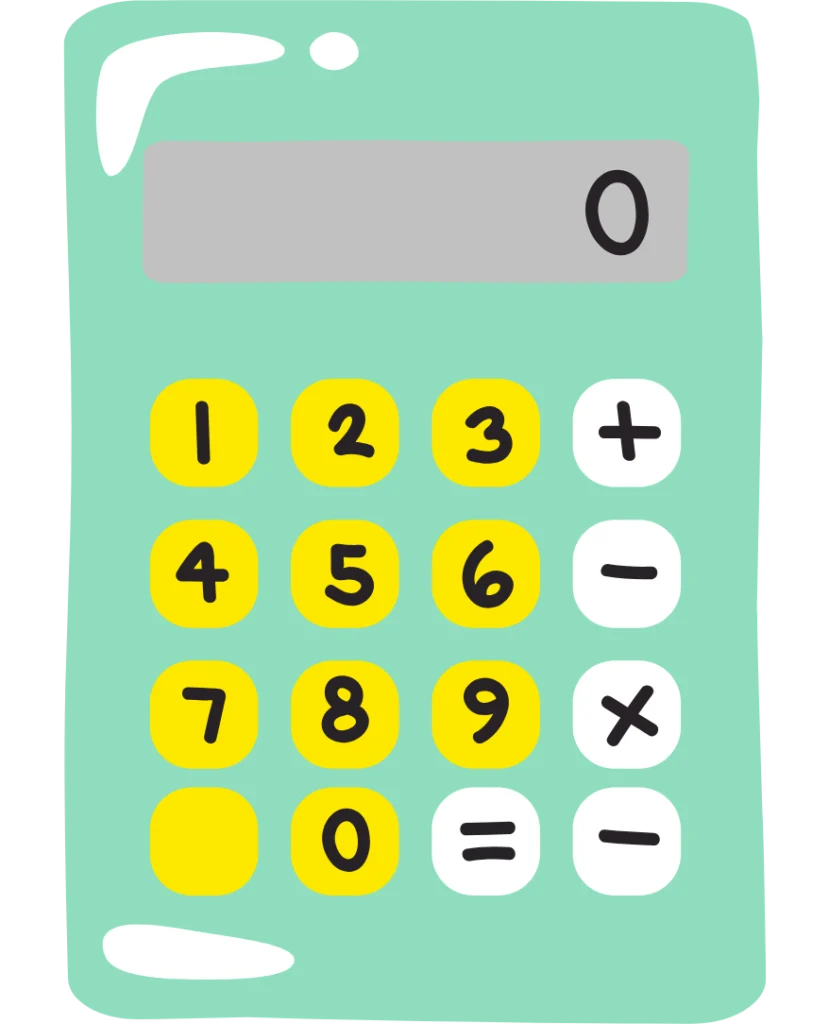
SGPA to CGPA Calculator
Method 1: Enter Individual SGPAs
Enter the SGPA for each semester. Click ‘Add Semester’ to input more semesters.
Method 2: Enter Total SGPA and Number of Semesters
Enter the total sum of all your SGPAs and the total number of semesters.
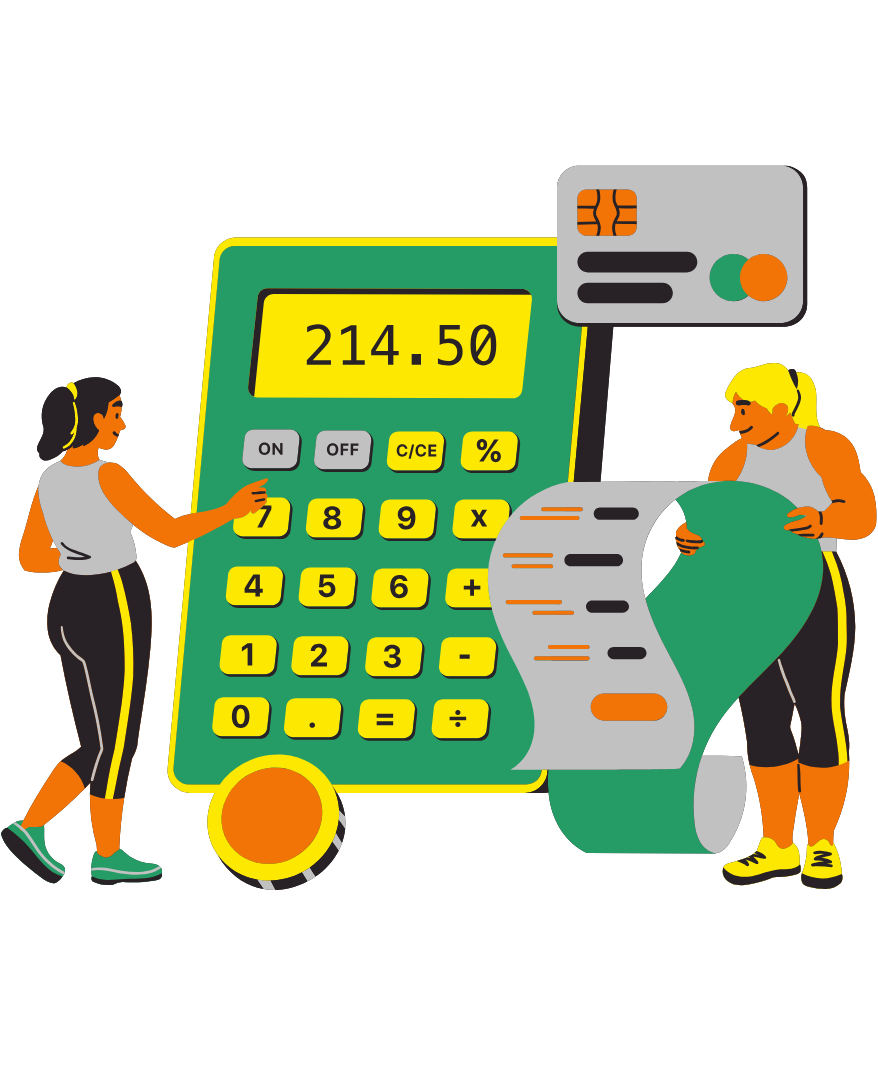
Fast and Simple: SGPA to CGPA Calculator - Made Easy
Our calculator makes complex grade conversions easy and effortless. With just a few quick inputs, you can convert your SGPA to CGPA with unmatched speed and accuracy. Whether on your phone, tablet, or desktop, experience hassle-free calculations whenever and wherever you need them.
What is SGPA?
SGPA means Semester Grade Point Average, is a grading system used to measure a student's academic performance within a specific semester. It is calculated by averaging the grade points earned in all courses, with each course weighted based on its assigned credit hours. This method provides a detailed assessment of a student’s strengths and areas for improvement, helping both students and educators track academic progress.
Universities may also use SGPA as a criterion for scholarships and job-related evaluations, highlighting its importance in academic and professional contexts.
To convert your SGPA into percentage for scholarship applications, use our SGPA into Percentage Calculator.
How to Calculate SGPA?
Calculating SGPA involves a simple process that translates your academic performance into a single, easy-to-understand number. Here’s how students can calculate their SGPA step-by-step:
- List the credit points for each subject from your academic performance sheet.
- Multiply each subject’s credit points by the grade you earned in that subject.
- Add all the results from step 2 to get the total grade points.
- Sum up the credit points for all subjects.
- Divide the total grade points by the total credit points.
Example Calculation:
Suppose a student has received the following grades and credit points for four subjects:
| Subject | Grade | Credit Points |
|---|---|---|
| History | 7 | 3 |
| Biology | 8 | 4 |
| Computer Science | 9 | 3 |
| Literature | 10 | 2 |
Step-by-Step Calculation:
- Credit points for each subject: already listed in the table.
- Multiply each subject’s grade by its credit points:
- History: 7 × 3 = 21
- Biology: 8 × 4 = 32
- Computer Science: 9 × 3 = 27
- Literature: 10 × 2 = 20
- Add the results:
21 + 32 + 27 + 20 = 100 - Sum of all credit points:
3 + 4 + 3 + 2 = 12 - Divide the total grade points by the total credit points:
100 ÷ 12 = 8.33
Thus, the SGPA for the semester is 8.33.
What is CGPA?
CGPA, or Cumulative Grade Point Average, is a comprehensive measure of a student's academic performance across all semesters or academic years within a program. Unlike SGPA, which focuses on a single semester, CGPA aggregates the grade points from all completed semesters, providing a holistic view of the student’s educational journey. It is calculated as the weighted mean of all semester grades, helping to evaluate long-term academic achievements.
This metric is significant in assessing overall performance, and influencing decisions related to scholarships, further studies, and job opportunities.
Additionally, if you need to convert your CGPA into a percentage, you can use our CGPA to Percentage Calculator.
Difference Between SGPA and CGPA
| Aspect | SGPA | CGPA |
|---|---|---|
| Definition | Grade point average for a specific semester. | Cumulative grade point average across all semesters. |
| Time Period | Calculated for one semester only. | Calculated for the entire academic program. |
| Scope | Evaluates performance within a single semester. | Evaluates overall academic performance over the entire course. |
| Calculation | Average of grade points earned in all subjects of a semester, weighted by credit hours. | Weighted mean of all SGPA values from all semesters. |
| Purpose | Measures short-term academic progress. | Measures long-term academic achievement. |
| Use | Used for semester-specific evaluation and improvement. | Used for final results, overall rankings, and degree classifications. |
| Feedback | Provides feedback for one semester. | Provides cumulative feedback on overall academic performance. |
| Academic Records | Appears in transcripts for individual semesters. | Appears as an overall score in academic transcripts. |
| Weightage | Relevant for the specific semester. | Affects the entire academic program and final outcomes. |

Why Use a CGPA Instead of an SGPA?
Using CGPA instead of SGPA offers several advantages, particularly for evaluating overall academic success. While SGPA provides a snapshot of performance in a single semester, CGPA gives a comprehensive view of a student’s achievements across the entire academic program. This cumulative measure is especially significant when applying for higher studies or job opportunities, as many institutions and employers use CGPA as a key selection criterion.
Moreover, CGPA serves as a valuable motivational tool. It allows students to track their academic progress over time, helping them set goals and monitor improvements. If a student’s CGPA is lower than desired, it can encourage extra effort in subsequent semesters. On the other hand, a high CGPA reflects consistent performance and can boost confidence, providing concrete evidence of sustained academic success.
How to Convert SGPA into CGPA
To convert SGPA to CGPA, follow these easy steps:
- List your SGPA values from each semester.
- Add up all the SGPAs to get a total sum.
- Count the number of semesters you’ve completed.
- Divide the total SGPA sum by the number of semesters.
CGPA Formula
CGPA =
Sum of SGPAs of All Semesters
Number of Semesters
Example
Imagine a student has these SGPA scores over four semesters:
- Semester 1: 8.0
- Semester 2: 7.6
- Semester 3: 8.3
- Semester 4: 7.9
Step 1: Add all the SGPAs: 8.0+7.6+8.3+7.9 = 31.88.0 + 7.6 + 8.3 + 7.9 = 31.88.0+7.6+8.3+7.9=31.8
Step 2: Count the number of semesters: 4 semesters
Step 3: Use the formula: CGPA = 31.84/4 = 7.95
Thus, the CGPA is 7.95.
Using our calculator can make these calculations faster and ensure precision.
Keep in mind that the CGPA reflects your overall academic performance, while SGPA shows your performance in individual semesters.

How to use our SGPA Calculator
Using our SGPA calculator is very straightforward. There are two methods available.
Method 1:
- Input the SGPA for each semester into the calculator.
- Click the “Calculate” button to see the CGPA.
- To perform the calculation again, use the “Reset” button.
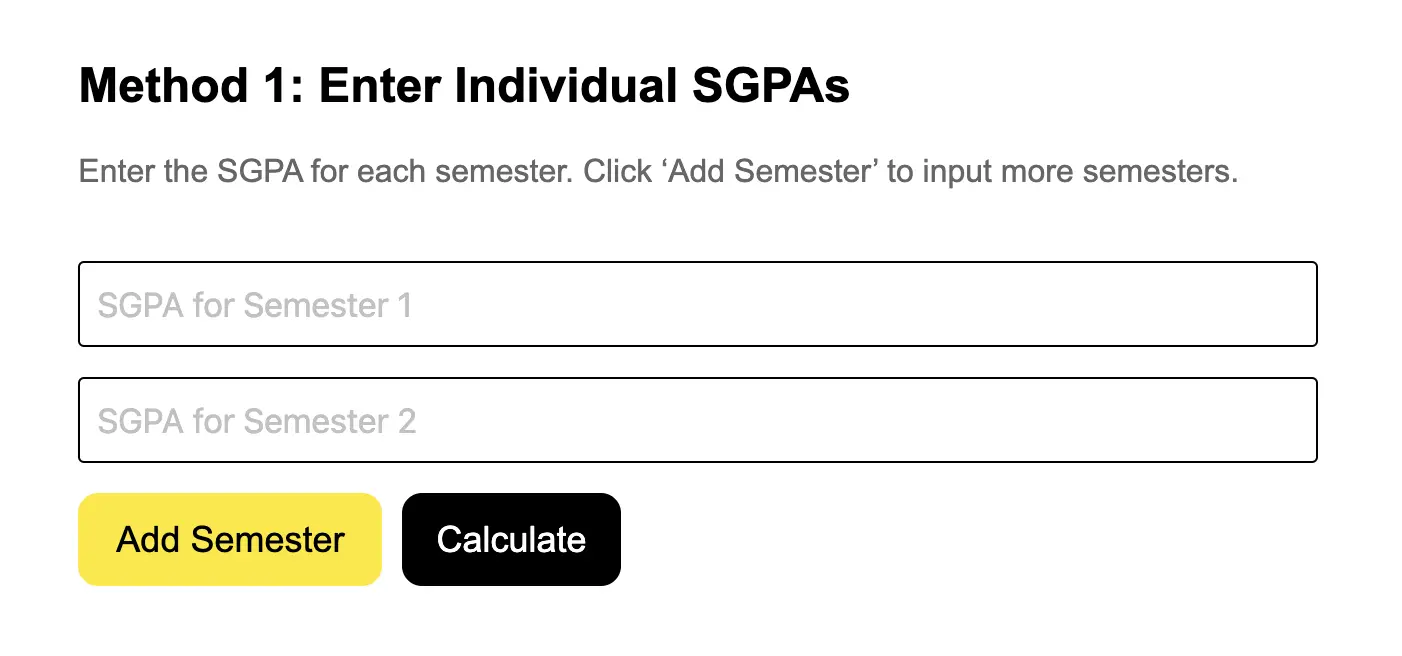
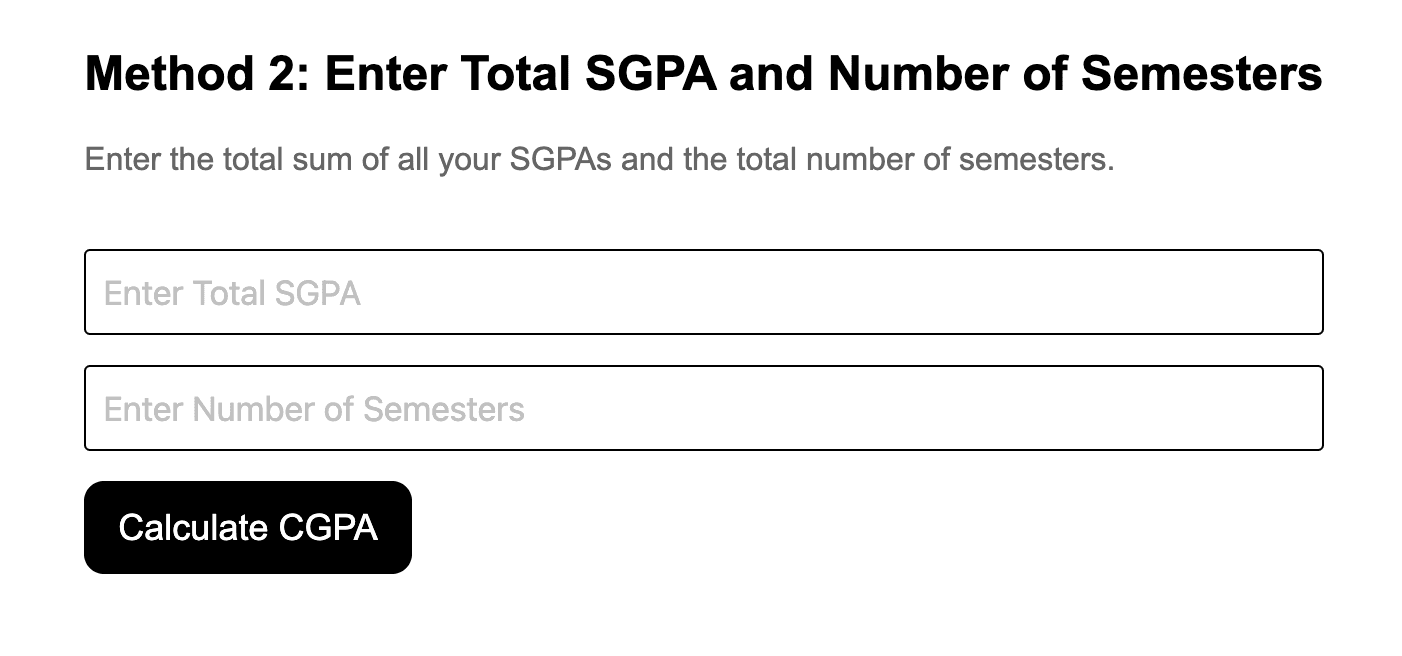
Method 2:
- Enter the sum of all your SGPAs into the first input box.
- Input the total number of semesters into the second input box.
- Your CGPA will be displayed automatically.
- Use the “Reset” button if you need to convert SGPA to CGPA again.
Common Conversion Errors to Avoid for SGPA to CGPA converter
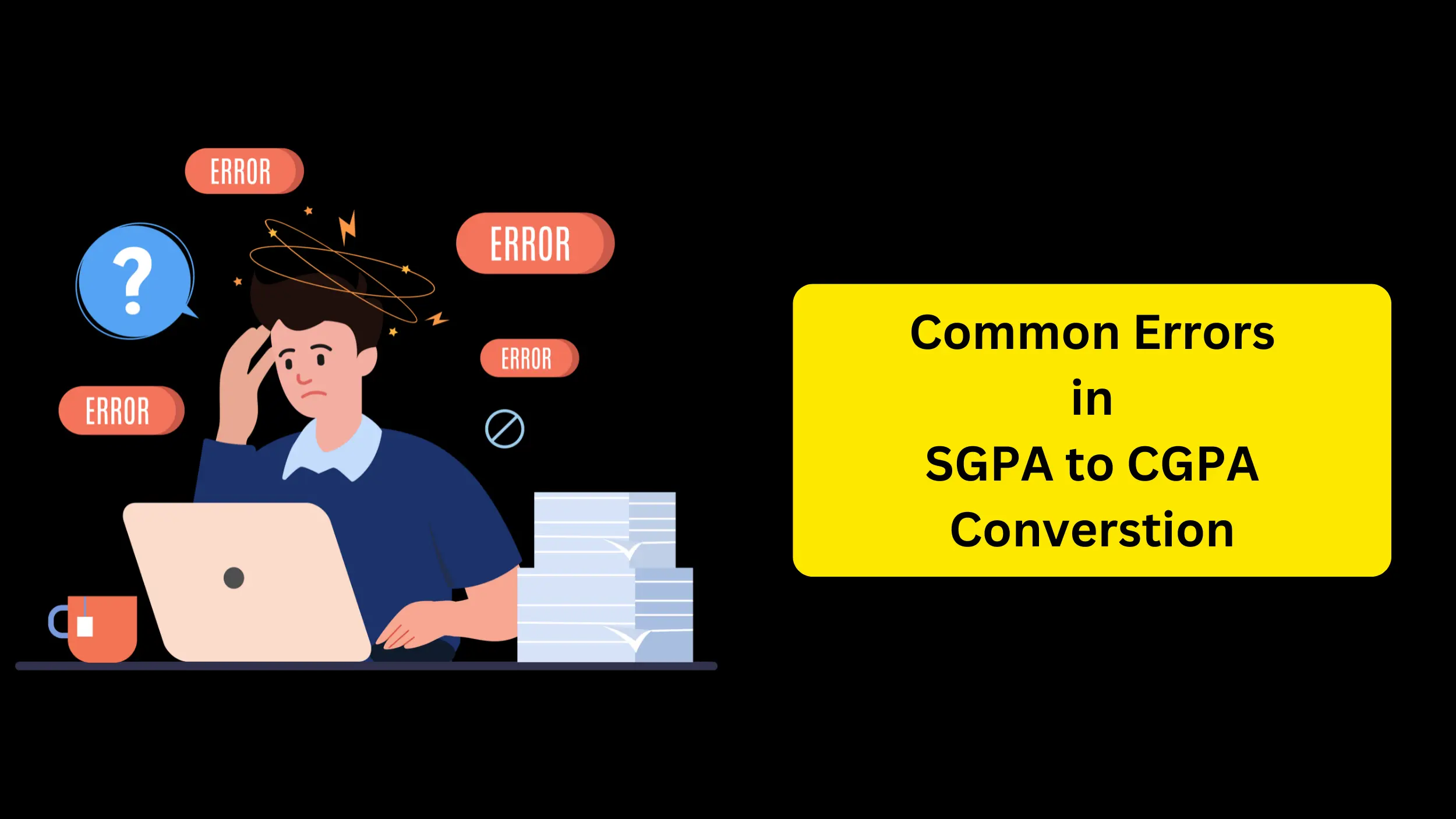
By keeping these errors in mind, you can ensure your SGPA to CGPA conversion is accurate and reflective of your true academic performance.
- Assigning Incorrect Credit Weightage: One common mistake is miscalculating the weightage of semester credits. Always ensure you multiply the SGPA of each semester by the correct number of credits. Incorrect weight assignments can lead to an inaccurate CGPA.
- Rounding Errors Too Soon: Avoid rounding off numbers prematurely during your calculations. Rounding at early stages can distort your results significantly. Keep values exact until the final step, and only then should you round if needed.
- Overlooking Failed Subjects: If your grading system includes failed subjects in the SGPA, they must be counted in your CGPA calculation. Ignoring these subjects will produce a misleadingly higher CGPA.
- Using the Wrong Credit Scale: Be mindful of your institution’s grading scale, whether it's a 4-point or 10-point system. Using the incorrect scale will result in faulty calculations, so always double-check the grading scale before starting.
- Assuming Equal Semester Weightage: Some semesters may carry more credit weight than others. Assuming all semesters have equal weightage when they do not will skew your CGPA. Verify if each semester has a different credit distribution and adjust accordingly.
- Confusing Grade Points: Misinterpreting grade points or failing to understand your institution's grading system can result in errors. Ensure you're familiar with how grade points are assigned and used in SGPA calculations.
- Skipping Semesters: Omitting any semesters from your calculation, especially if they include lower or higher scores, will lead to inaccurate results. Be sure to account for every semester you have completed, including part-time or gap semesters.
- Not Double-Checking Calculations: Even small calculation errors can have a major impact on your final CGPA. Always review your calculations thoroughly. It’s wise to use a reliable SGPA to CGPA calculator to minimize the risk of manual errors.
Conclusion
Understanding how to accurately convert SGPA to CGPA is essential for students tracking their academic progress and aiming for future opportunities. Our SGPA to CGPA Calculator simplifies this process, ensuring precise and error-free results with just a click. By leveraging this tool and being mindful of common mistakes, students can gain a clearer picture of their academic standing and remain motivated to excel in their studies.





